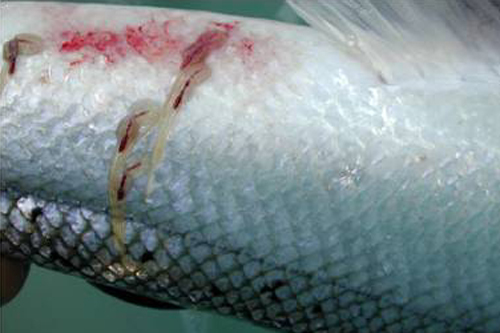THE SALMON & Trout Association (S&TA) has today published a report into official data on sea-lice treatment chemical residues in Scottish sea lochs associated with Scottish salmon farms.
The report, based on information obtained under Freedom of Information (FOI) from the Scottish Environment Protection Agency (SEPA), shows that, contrary to repeated assurances by the fish-farming industry, there are serious concerns over:
- The failure of fish-farmers to report to SEPA self-monitored data concerning sea-lice chemical residues in the sea-bed of Scottish sea lochs.
- Sea-lice chemical residues in excess of Environmental Quality Standards.
- A reduction in audit or ‘check’ monitoring of sea-bed residues of sea-lice chemicals by SEPA, despite its role as Scotland’s environmental regulator.
Chemicals used to treat Sea Lice are polluting Scottish waters
This is occurring at a time when there is a significant increase in the amount of in-feed sea-lice treatment chemicals used in Scotland as the industry expands, and a spread of resistance to sea-lice chemicals, meaning farmers need to treat more often.
While wild fish conservationists have long voiced their concerns over the impact of huge discharges of juvenile sea lice from the fish-farms causing damage to emigrating juvenile wild salmon and sea trout, concerns are also being expressed by commercial shell fishermen as to the chronic effect of the use of sea lice treatment chemicals on marine crustaceans, such as crab, lobster, prawn and shrimps.
Hughie Campbell Adamson, Chairman of S&TA Scotland, said: “The information from SEPA raises serious concerns over the impact of in-feed sea lice treatments. While the control of sea lice on fish-farms is essential, it would not be environmentally responsible to threaten marine shellfish populations as a consequence.
“The only sustainable solution is for closed containment production, which massively reduces the need for farmers to use these toxic sea-lice control chemicals, as well as minimising other impacts from salmon farming on wild fish, shellfish and the wider marine environment.
“The sooner Scotland follows Canada in piloting closed systems the better. Scotland can either grab the future of aquaculture with both hands or it can be left behind.”
In its response to the Scottish Government’s consultation on the Aquaculture and Fisheries Bill, the Scottish Salmon Producers’ Organisation (SSPO) has argued strongly for less regulation of their industry, stating that breaches of regulation by the industry are “uncommon” and that it “has no history of non-compliance”. (SSPO Bill response, pages 16/17)
Guy Linley-Adams, Solicitor to the S&TA Aquaculture Campaign, said: “The findings of the S&TA report casts doubt on SSPO claims and show why the Scottish Government, which has legal obligations to protect the wider environment, must ensure that it has all the necessary powers within the forthcoming Aquaculture and Fisheries Bill to deliver robust regulation of the fish farming industry.”
Linley-Adams concluded: “The SSPO must realise that the aquatic environment does not belong to the salmon farming industry, and that it must protect natural resources for the wider public good.”
The report’s publication follows the end of a facilitated discussion process held with the salmon farming industry. During the process, organised by the Scottish Government, S&TA made strenuous efforts to address the concerns raised by the industry but, regrettably, the SSPO and S&TA remain far apart on the central issue of the industry’s impact on wild fish protection.
Paul Knight, CEO of S&TA, said: “We entered these discussions in good faith, but we made it clear from the very start that we needed to see substantive progress and commitment to change from the aquaculture industry and NOT just more talking. Instead the industry’s current position appears to be reflected in what can only be described as a rather intemperate response to the Scottish Government’s consultation on the forthcoming Bill.
“What this means is that the official mediation process is now over. We are grateful to the Scottish Government for promoting and supporting these discussions, but it must now be clear that this industry requires stricter regulation in the forthcoming Bill and increased scrutiny of the industry by SEPA inspectors.”
